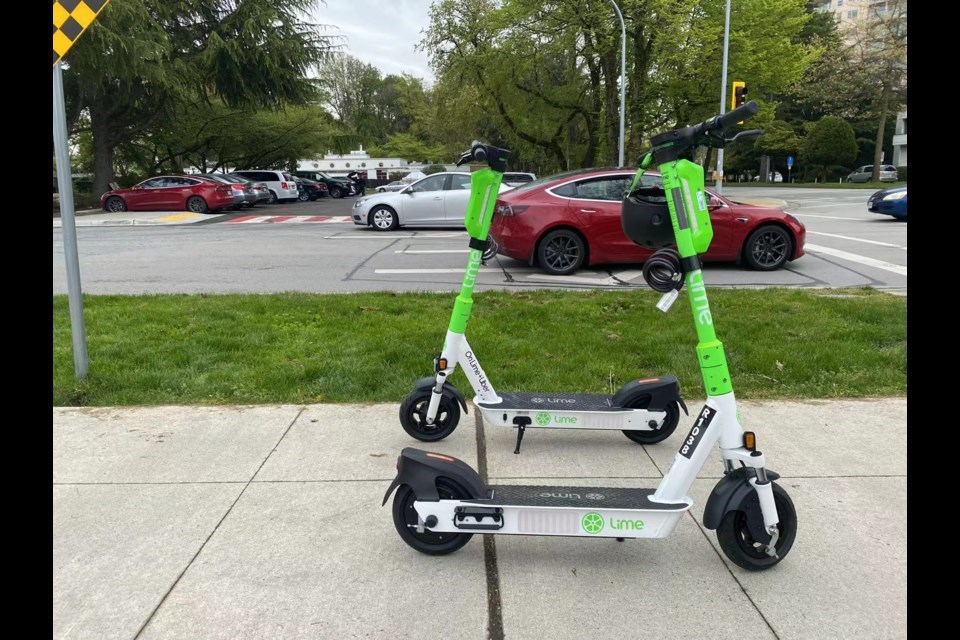The City of Vancouver’s plan to hire a company to launch a public electric scooter sharing service in the city will likely not happen until the spring of 2024, according to a city councillor with knowledge of the initiative’s status.
Sarah Kirby-Yung said the city won’t issue a request for proposals (RFP) for the service until this fall because staff is taking time to consult with advisory groups, conduct research and define the program, which is expected to be launched at no cost to taxpayers.
“I put forward the motion [in June 2022] to proceed with it, and that was one of the key tenets — that it's an RFP done at no cost to the city,” Kirby-Yung said Friday. “And it was either revenue-neutral or revenue-positive. So that's the approach.”
A December 2022 memo to council from Lon LaClaire, the city’s general manager of engineering services, said a launch date will be driven by the system operator or operators and that it is dependent on their capacity.
“Looking at previous examples in Vancouver and neighbouring communities, operators typically take six months to over a year to launch a shared micro-mobility system, once the RFP is concluded,” said LaClaire in the memo, which has since been posted to the city’s website.
In explaining why the RFP posting is several months away, LaClaire said there were examples of communities, locally and across North America, where a shared e-scooter system was implemented more quickly but not successfully, resulting in significant restructuring or full removal of the system.
He didn’t name the cities.
“Informed by other municipalities' recent shared e-scooter pilots, staff will develop an RFP that is aligned with city goals, responds to local industry capacity and secures the best value for the city,” LaClaire said.
'Revenue-neutral, or revenue-generating'
Based on work to date, he said, staff anticipate the successful proponent will provide a system which will “potentially be revenue-neutral or revenue-generating” for the city, provide local living-wage jobs and include a council-directed equity program.
“To protect riders and vulnerable users, the system is anticipated to be station-based,” LaClaire said.
The shared scooter proposal is not to be confused with Vancouver’s current participation in a pilot program the provincial government announced three years ago that allows the city and five other municipalities to amend bylaws to approve street use of the two-wheeled machines.
In Vancouver’s case, e-scooters are allowed on local streets and protected bike lanes, sharing the roads and paths with the city’s existing Mobi by Shaw Go shared bicycle service, which was implemented several years ago.
Kirby-Yung said the noticeable increase in people using scooters in Vancouver shows there is demand for alternative forms of transportation. The cost, however, to buy a scooter, which can run more than $1,000, is prohibitive for many people, she said.
Richmond launched e-scooter share in 2022
The Richmond News learned in May 2022, when the City of Richmond hired Lime to launch a shared e-scooter service in that city, that it costs $1.15 to unlock the scooter and $0.35 per minute. The News reported that it cost close to $5 for about a 10-minute trip.
A city staff report to Richmond council in June 2022 found over a 21-day period there were 1,415 trips, or an average of 67 per day. The average trip length was 2.5 kilometres and average trip time was 25 minutes.
Highest usage of the scooters was Fridays and Saturdays.
More than 3,400 people had signed up for a membership in May 2022.
In Richmond, a helmet is provided with each scooter. All parking corrals for the scooters are located on roadways with cycling facilities. The corrals are “geo-fenced” and riders can only end their rides in a designated corral.
The GPS capability of the scooters enables geo-fence technology to ensure speed limits and “no go” zones are consistent with city bylaws. A mandatory “training mode” on the scooters reduces a first-time user's maximum speed to 12 km/h for the first three trips.
'Road tax' money funds e-scooter work
Prior to the election of the new ABC Vancouver-majority council in October 2022, city staff questioned where money would come from to fund work to get to the shared scooter service to the RFP stage.
That became clear when Kirby-Yung and her ABC colleagues suspended the city’s work on studying transport pricing for Vancouver, claiming at a council meeting in December that they effectively “killed the road tax.”
The result is that the balance of the $1.5 million dedicated to transport pricing — about $800,000 — will now be redirected to the e-scooter work, which involves more staff and assisting the operator or operators launch the service.
“It's not if people are going to use these scooters, it's the fact that they're here and they're happening,” Kirby-Yung said. “Consumer behaviour and technology is way ahead of regulation now, and the regulation needs to catch up. So it makes sense to create an environment where people can do that.”

.jpg;w=120;h=80;mode=crop)


